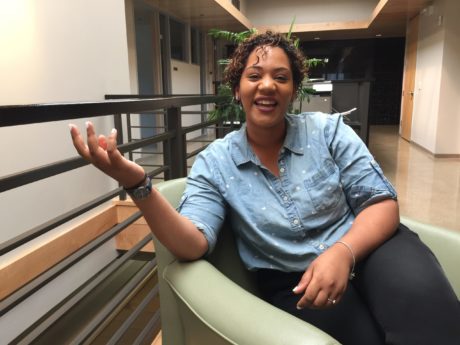

Already a young adult lay leader in the Episcopal church, Maria Bautista recently started work as a community organizer with congregations in the Diocese of Texas. EHF asked Bautista a few questions about her work to bring forward new leadership and voices in communities. She reflects on some of her experiences that intersect with passion, purpose and personal ministry in her work with San Pedro/St. Peter’s Episcopal Church in Pasadena.
Bautista works for The Metropolitan Organization (TMO), an EHF community partner.
You recently started work with TMO helping congregations organize in their community. What drew you to that work?
My first meeting was an accountability session in Pasadena for representatives. So, we had Mary Ann Perez and Gilbert Pena who were running for State Representative. The second I walked in and knew what they were doing, I wanted to be a part of that. I wanted to know how to get involved.
It was a group of about 100 or 150 Latinos being able to not only hear the candidates, but to offer what is going on in their community personally to the candidates, to be heard and know that there was going to be follow up. The candidates made a promise that if elected, “I will follow up in 60 days to sit down and talk about your agenda.” So, it was incredible.
And then I understood. This is what organizing is about. You’re bringing people’s concerns, their issues, and you’re letting these elected officials, who work for us, know about it. There’s always negotiating and talking, but the fact is that you’re being heard.
Have you seen results from that first meeting? Have they come back for their accountability session?
They have been in session in Austin so it was hard to get Mary Ann Perez to us, but we negotiated. We told her, “we’ll go to Austin” and she said “sure”. So, we took Padre Pedro, Estella and some other leaders and we took them up to the state capitol and they were able to have the conversation there with her. Once the session is over she’s going to come talk to the congregation and see what exactly is going on.
And from that, I saw in the community a huge change too, in the sense that there are more people wanting to be a leader, more interest in how to be a leader, and just getting to know each other’s stories.
As the voices come together, it tightens and builds the community, correct?
Yes. It’s also a self-development kind of thing. I don’t go into St. Peter’s and say, “The flavor of the month today is healthcare, so that’s what we are going to focus on.” No, we start the conversation with the house meeting, which is a session where everyone comes together. We ask a very simple question, “What are the pressures affecting your family?” Not in Africa, not in Paris, not in London. What is affecting your family right here, right now, directly? From that, springs forward immigration; specific issues of immigration infrastructure, healthcare, education, I mean the list goes on.
And I’m not the one doing it. It’s small groups doing it. I’m kind of walking around making sure everything’s going well. They’re the ones bringing people together for neighborhood walks and phone banks, etc. It’s also a huge teaching moment for myself, and a learning moment for them.
What else has the work taught you about the impact the congregation can have in the community?
They are talking to people they thought they’d never be talking to, like mayoral candidates. We are non-partisan, so it’s not that we endorse any candidate. But the fact that you’re able to sit with people of influence, knowing that if they win they’ll be able to listen to your issues, it’s a great thing for our people, because they didn’t think it’d be possible.
What are you learning about what it takes to build relationships and to develop leaders who take action in their communities?
I think it comes from the house meeting and listening to other people’s stories. Let’s say we go to the same church, right? I might know your kids, your name, where you work, but I might not know that you lost your job and now that you don’t have healthcare for your family and that you’re struggling with that. Once you listen to their private pain being brought public, you can’t just go home and be like, “uh, I’ll just forget about that.” No, it’s “now I know what it is that I want to work with you on and to see it through.” We have people whose streets are just horrible and that their water is orange, and that’s not good. And not only does their pain become part of your story as well, but you get to know that other people are going through the same thing as you.
So, the plumbing issue wasn’t something that just one person had. It was something that a lot of people had and they didn’t know it because that’s not something they would talk about. So, I think in that sense it brings them together. It brings the community tighter together, and together we work further on that goal, so they are energized about talking to the candidates.
Tell me a little about your own personal background and history with the Episcopal Church.
I’ve been in the Episcopal Church for about 15 years. My dad Simon Bautista is an Episcopal priest. He works at the Cathedral. I’ve always been involved. If it wasn’t choir, it was at VBS, if it wasn’t VBS, it was City CAP in Philadelphia. It was always something, being a Sunday School teacher, youth group — always very involved.
Now that I’m working with TMO I’m able to meet a lot of other Episcopal churches like Hope Episcopal. I got to meet Rev. Roberta Knowles and Francene Young and that was incredible. Getting to talk to these incredible people has been an enriching experience for me in my own faith ministry because I’m getting to know all these other churches and fellow brothers and sisters.
Listening to you now, it makes me wonder; how has the community involvement impacted young people? Do they see the adults or their parents differently because of the organizing work?
Not only do they see their parents differently, they’re getting involved! In the accountability session we had, one of our co-chairs was a 17-year-old that’s about to graduate. I mean it’s incredible.
At St. Peter’s, a lot of the youth are getting involved. We’re having a phone bank and it’s mainly just them. Not to take credit from the adults. The adults are great leaders, but I’m surprised and I’m very happy with the presence of the youth. They’re interested in what’s going on. They have such insight on many things.
When did you move to Houston? And What have you learned about Houston?
I moved to Houston three years ago from Maryland. I’m originally from the Dominican Republic.
This is where I first experienced racism. I was older, so I was more in tune with what was actually going on in my surroundings. I’ve had many more experiences of people thinking differently than me.
But I also experienced welcome. It’s been a very welcoming community at Christ Church Cathedral, and also the other communities I’ve gone to. It’s been a learning experience of all sorts.
I can only say that God knows what He does, right? At first, I did not want to be in Houston, but now, it’s only been a blessing.